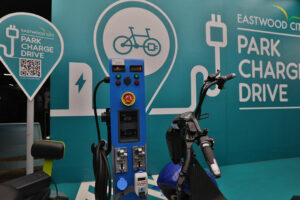By Sheldeen Joy Talavera, Reporter
THE Department of Energy (DoE) is looking to start requiring gas stations to have electric vehicle (EV) charging points this year, as part of efforts to boost EV adoption in the country.
Patrick T. Aquino, director at DoE – Energy Utilization Management Bureau, said that the department will release the draft issuance for comments and conduct public consultations within the year.
“The proposal is to require liquid fuel retail outlets (LFRO) to have electric vehicle charging points depending on the ratio of number of dispensing pumps,” Mr. Aquino told BusinessWorld.
“The operator of the LFRO can directly install, operate and maintain the EV charging point or allow a third party to do the same,” he added.
Mr. Aquino said that the DoE will be identifying priority areas for implementation, adding that it will be done in phases.
Asked on when the department targets to implement the policy, he said: “within the year.”
“The DoE is pushing for EV charging infra in LFRO to improve access and availability for EV users,” Mr. Aquino said.
Under the Republic Act No. 11697, otherwise known as the Electric Vehicle Industry Development Act (EVIDA), gasoline stations identified in the Comprehensive Roadmap for the Electric Vehicle Industry (CREVI) are mandated to designate dedicated spaces for the installation of commercial use charging stations for the general public.
EVIDA aims to promote the development and adoption of EVs in the Philippines by mandating an increase in the share of EVs in corporate and government fleets, which is expected to generate more demand for EVs.
Under CREVI, the business-as-usual scenario target is a 10% EV fleet share by 2040, while it sets a clean energy scenario target of at least 50%.
According to the DoE, there are 104 DoE-accredited EV charging station providers nationwide as of November 2024.
Mr. Aquino said at present, there are EV charging points in some stations of Petron Corp., Unioil Petroleum Philippines, Inc., Seaoil Philippines, Inc., and Shell Pilipinas Corp.
Edmund A. Araga, president of Electric Vehicle Association of the Philippines, said that the policy is “a bold move” showing the government’s commitment to hit the targets under CREVI.
“We are optimistic that number of EVs will continue to increase by at least 20% as more consumers are now considering owning an EV in addressing issue on gas price increase,” Mr. Araga told BusinessWorld via Viber.
Mr. Araga said there are many EV brands in the market, allowing consumers to have a wider array of vehicles to choose from.
“We see continued demand for oil products, despite developments in EV and other renewable energy sources. Especially in the Philippines, to-date, gasoline and diesel is still a strong contender in the transport sector market and no major shift is expected in the near future,” Leo P. Bellas, president of Jetti Petroleum, Inc., said in a Viber message.
Mr. Bellas said that the company has no definite plans yet but “will actively engage should the time comes in support of the initiatives of the DoE.”
For Cebu-based fuel retailer Top Line Business Development Corp., its President and Chief Executive Officer Eugene Erik C. Lim said the company is still finalizing its rollout plan for the EV charging infrastructure for its stations.

